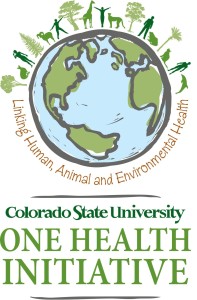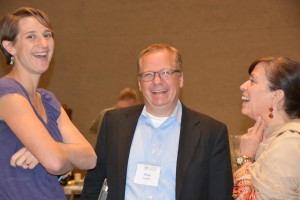 Nearly 100 people gathered in the Lory Student Center at Colorado State University in late September to discuss food systems, not just food but all the steps involved in getting your food from farm to fork. The One Health Initiative Food Systems Workshop brought CSU faculty and staff together with CSU Extension agents from across Colorado, plus stakeholders from production agriculture, government, and the food industry.
Nearly 100 people gathered in the Lory Student Center at Colorado State University in late September to discuss food systems, not just food but all the steps involved in getting your food from farm to fork. The One Health Initiative Food Systems Workshop brought CSU faculty and staff together with CSU Extension agents from across Colorado, plus stakeholders from production agriculture, government, and the food industry.
One Health, an initiative supported by the Office of the Vice President for Research and all CSU colleges, recognizes that the health of humans, animals and agro-ecosystems are interdependent. It involves applying a coordinated, collaborative, transdisciplinary and cross-sectoral approach to reveal and address potential or existing challenges that originate in the interplay between humans, animals and their various environments.
Building trust
In this instance, the sometimes complicated conversation surrounding food production, distribution, quantity, quality, security and safety – collectively referred to as the food system – was at the heart of the conference. Social, political, ecological and cultural factors were prominent during discussions.
“Conversations that go both ways build trust,” said one of the conference organizers, Ragan Adams, veterinary Extension specialist in the Department of Clinical Sciences. “Trust is necessary to promote healthy discussions between farmers and consumers regarding food as well as academics and other stakeholders regarding socially relevant research.”
Five goals

The two-day conference, supported in part by CSU’s Office of Engagement and Agricultural Experiment Station, focused on short food chain systems; those with fewer steps from farm to fork. Presentations on day one focused on better understanding the food system terrain including questions such as, “Who are the stakeholders in agriculture?” and “How do we get them involved and share their knowledge?” Day two was a brainstorming day, and in the end five concrete “areas of interest” with associated action steps where agreed upon:
• Importance of communication with consumers
• Use of system dynamics approaches in assessing food systems
• Encouraging consistent public policies
• Respecting uniqueness of place
• Ecosystem assessment
“The workshop team is digesting the outputs and we are talking about intended next steps,” said Bruno Sobral, director of CSU’s One Health Initiative. “This team is organizing, prioritizing and extending each action step and will hopefully move toward prototyping solutions.”

Sobral, who joined CSU last month as the founding director of the nascent One Health Institute, has a background in agricultural engineering, bioinformatics, genetics and evolutionary biology, and was the founding director of the Virginia Bioinformatics Institute at Virginia Tech.
Next steps
Workshops participants shared their impressions afterwards using terms like “engaging”, “informative” and “making better field-to-campus and town-to-gown connections”. The challenge in the coming months will be to develop these areas of interest and expand community stakeholder input. This will be accomplished by combining the talents of dedicated academics, the community connections cultivated by county Extension agents and the passion that consumers have about their food.
“For the past decade agriculture has asked itself ‘How are we going to feed the world?’” said James Pritchett, executive associate dean in the College of Agricultural Sciences. “Now we are asking, ‘How can we work together to feed the world efficiently, sustainably and with an eye toward the environment and human health?’ It is an inspiring challenge.”
For more information on the workshop, visit the 2015 Food Systems Conference website – or information on the One Health Initiative visit the website.